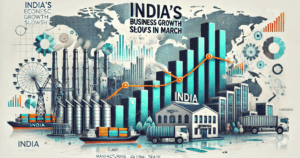India’s Business Growth Slows in March as Services Sector Weakens
India’s business growth slowed in March as strong manufacturing activity couldn’t fully offset a decline in the services sector, according to a private survey. The HSBC India Composite PMI dropped to 58.6 from 58.8 in February, missing the forecast of 59.0. Manufacturing performed well, with its PMI rising to 57.6, but the services sector saw a decline to 57.7, dragging down overall growth. New manufacturing orders and production increased, signaling improved conditions. However, demand for services weakened, and international demand for both sectors grew at its slowest pace in three months.
Export orders were impacted by new U.S. tariffs on China, Canada, and Mexico, with more set to take effect on April 2. Business confidence dropped to a seven-month low due to uncertainty, leading to a slowdown in hiring.

India’s Business Growth Slows in March as Services Sector Weakens
India’s economy saw a slight slowdown in March 2024, despite strong manufacturing performance, as weakness in the services sector weighed on overall growth. A private survey released on Monday highlighted mixed trends across industries.
The HSBC India Composite Purchasing Managers’ Index (PMI)—a key indicator of business activity—dipped to 58.6 in March from 58.8 in February. While this figure still signals expansion (as readings above 50 indicate growth), it fell short of the Reuters poll forecast of 59.0. The decline underscores how a sluggish services sector offset gains in manufacturing, which has now maintained steady growth for over three and a half years.
Manufacturing Shines, Services Lose Momentum
The manufacturing sector remained a bright spot, with its PMI rising to 57.6 in March from 56.3 in February. This marked the fastest pace of growth since July 2024, driven by increased production and new orders. Companies reported better business conditions, supported by stronger demand and improved efficiency.
In contrast, the services sector—a major pillar of India’s economy—saw its PMI drop to 57.7 in March from 59.0 in February. This decline was attributed to weaker demand, leading to fewer new business opportunities. Industries such as IT, hospitality, and finance, which rely heavily on domestic and international clients, faced challenges.
Export Growth Slows Amid Global Uncertainties
International demand for Indian goods and services also weakened, with export orders expanding at their slowest rate in three months. Pranjul Bhandari, Chief India Economist at HSBC, linked this slowdown to global trade disruptions, including new U.S. tariffs on imports from China, Canada, and Mexico. Additional tariffs set to take effect on April 2 have further heightened uncertainty, making businesses cautious about cross-border trade.
Business Confidence Hits Seven-Month Low
A combination of slower services growth, weaker exports, and global trade tensions dampened business optimism. Confidence levels among Indian firms dropped to a seven-month low, prompting companies to scale back hiring. Job creation slowed across both manufacturing and services, as firms adopted a cautious approach amid economic uncertainties.
Key Takeaways
- Manufacturing Resilience: Factory output and new orders increased, highlighting strength in this sector.
- Services Sector Struggles: Reduced demand weighed on services, emphasizing its vulnerability to changing economic conditions.
- Global Trade Pressures: Export growth was hampered by geopolitical uncertainties and shifting tariff policies.
- Hiring Slowdown: Businesses remained cautious, leading to slower job creation across sectors.
Looking Ahead
While India’s economy continues to expand, the March PMI data presents a two-speed growth pattern. Manufacturing remains strong, but the services sector—which employs millions and significantly contributes to GDP—needs renewed momentum to sustain broader economic growth. Economists warn that global trade policies and domestic demand trends will play a critical role in shaping India’s economic trajectory in 2024.
Overall, India’s businesses are navigating a complex landscape. Factories are thriving, but the services sector is facing headwinds, and global uncertainties are adding to the challenges. The country’s ability to balance these factors will determine whether growth accelerates or stalls in the coming months.
You must be logged in to post a comment.